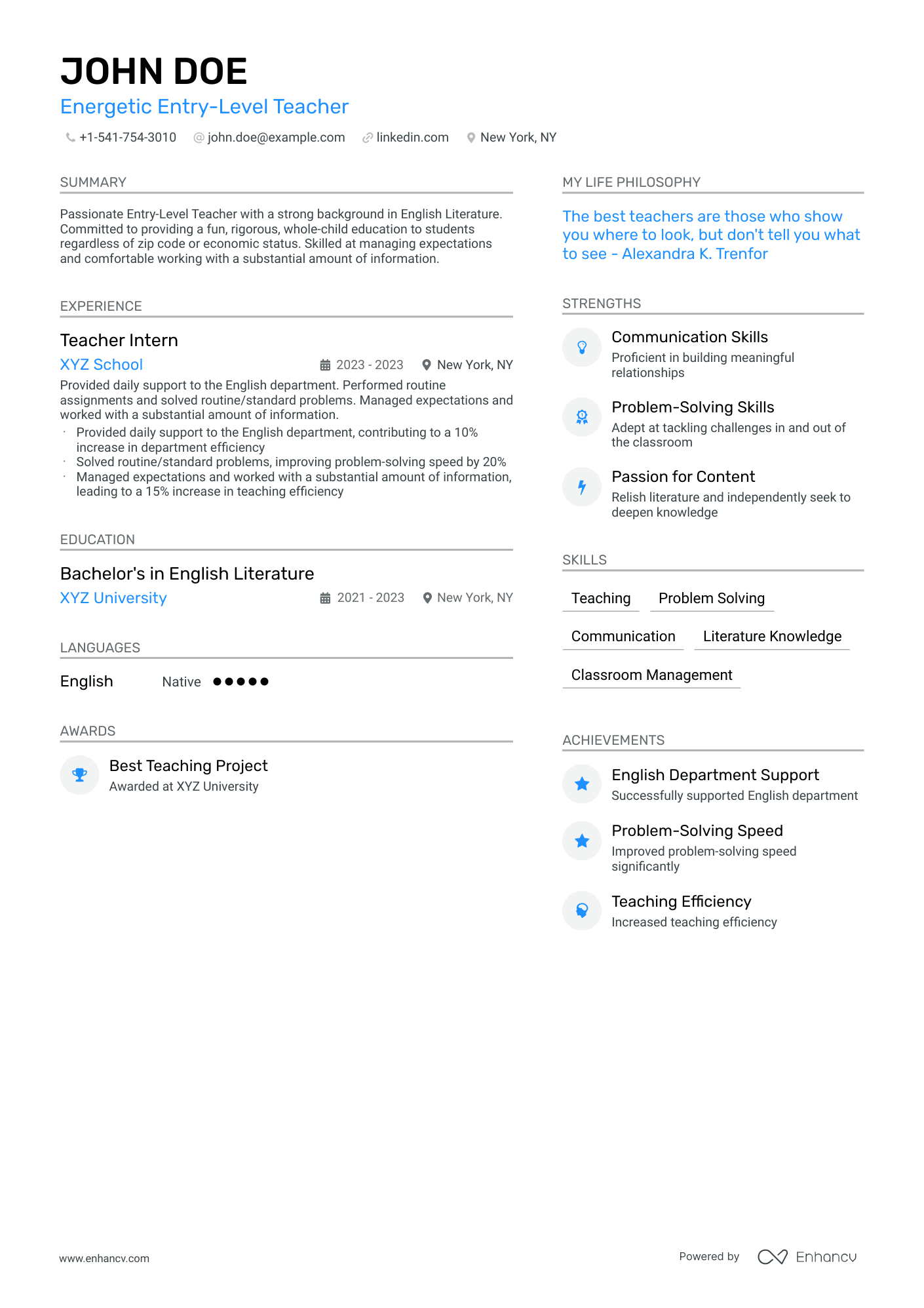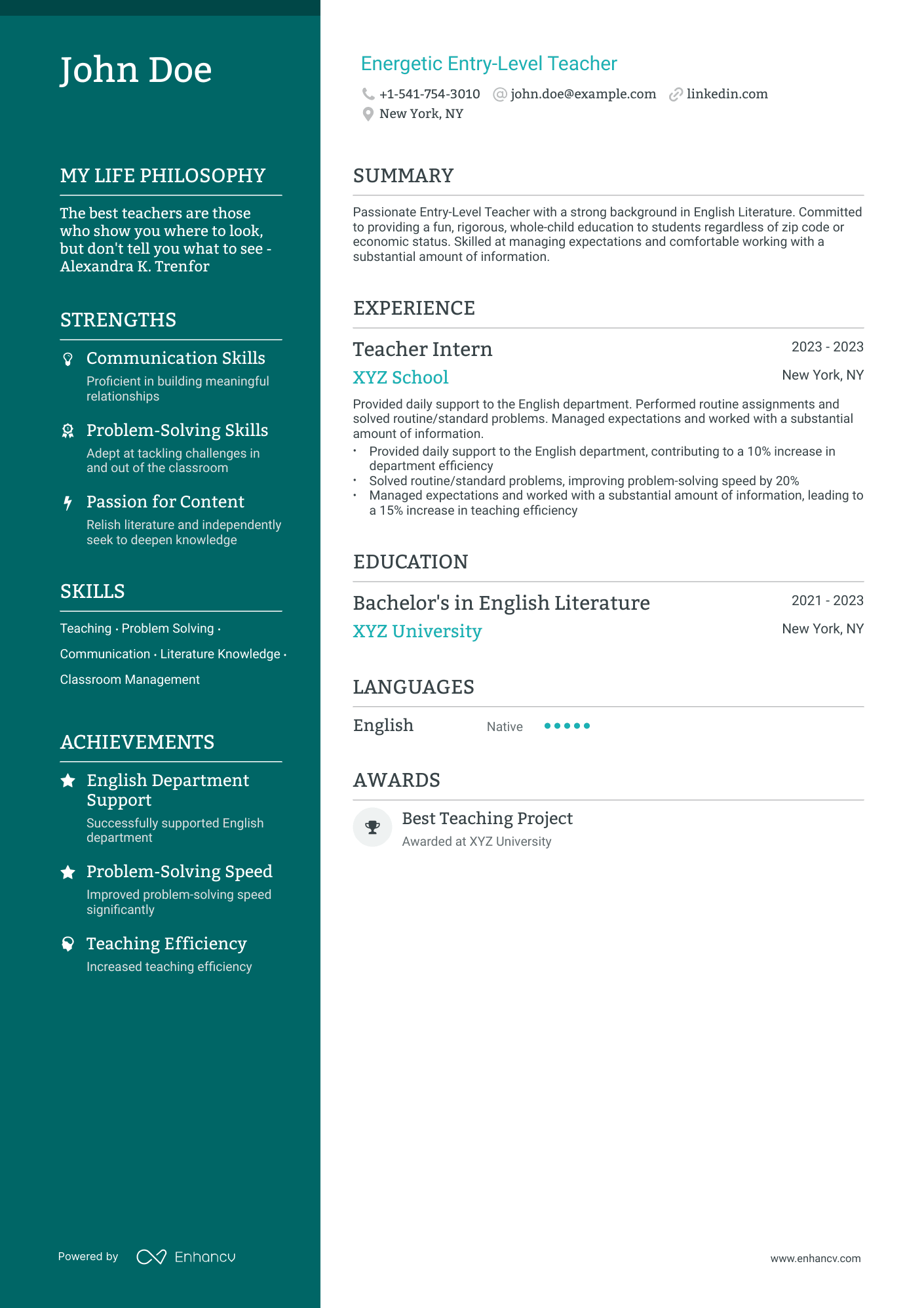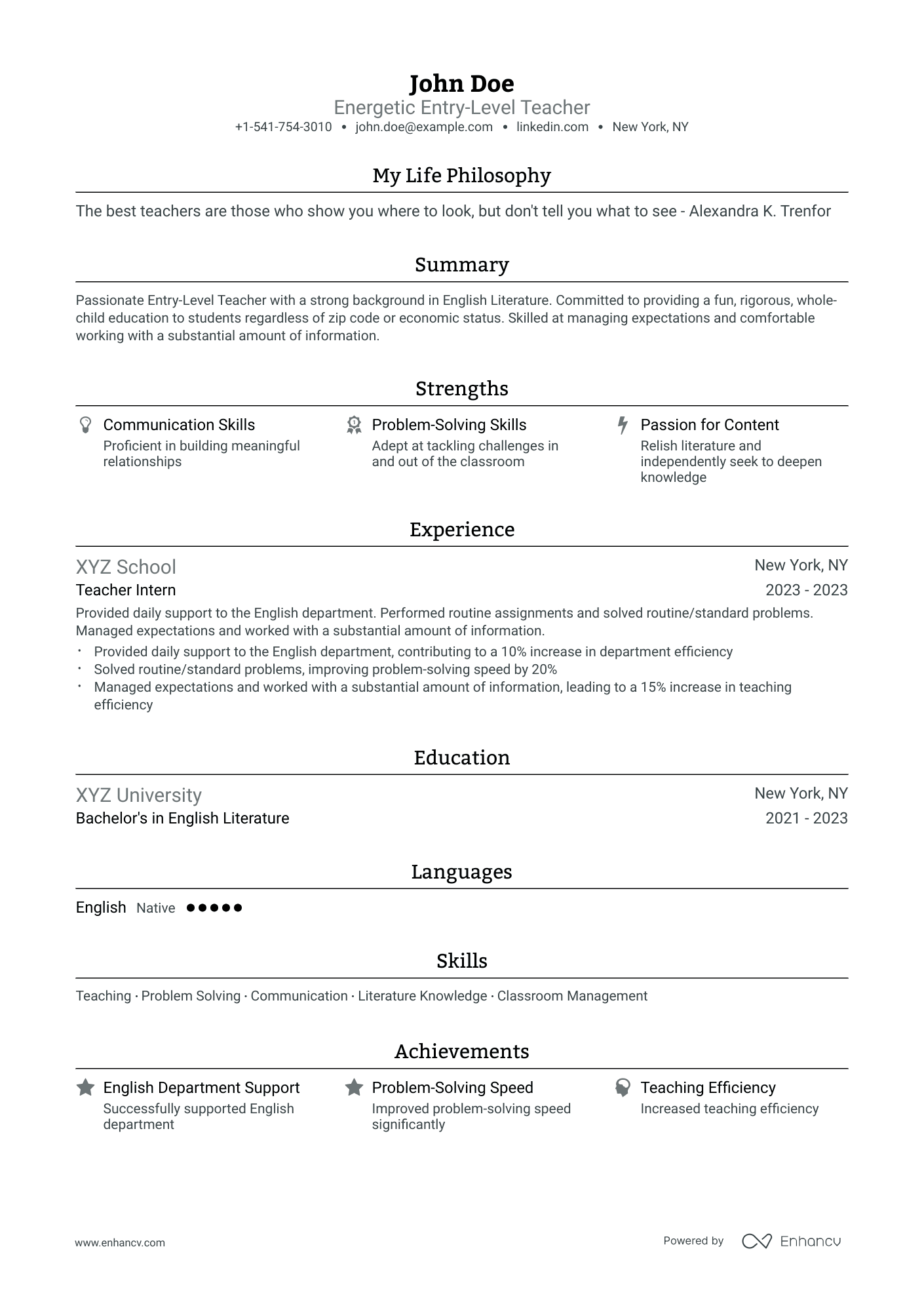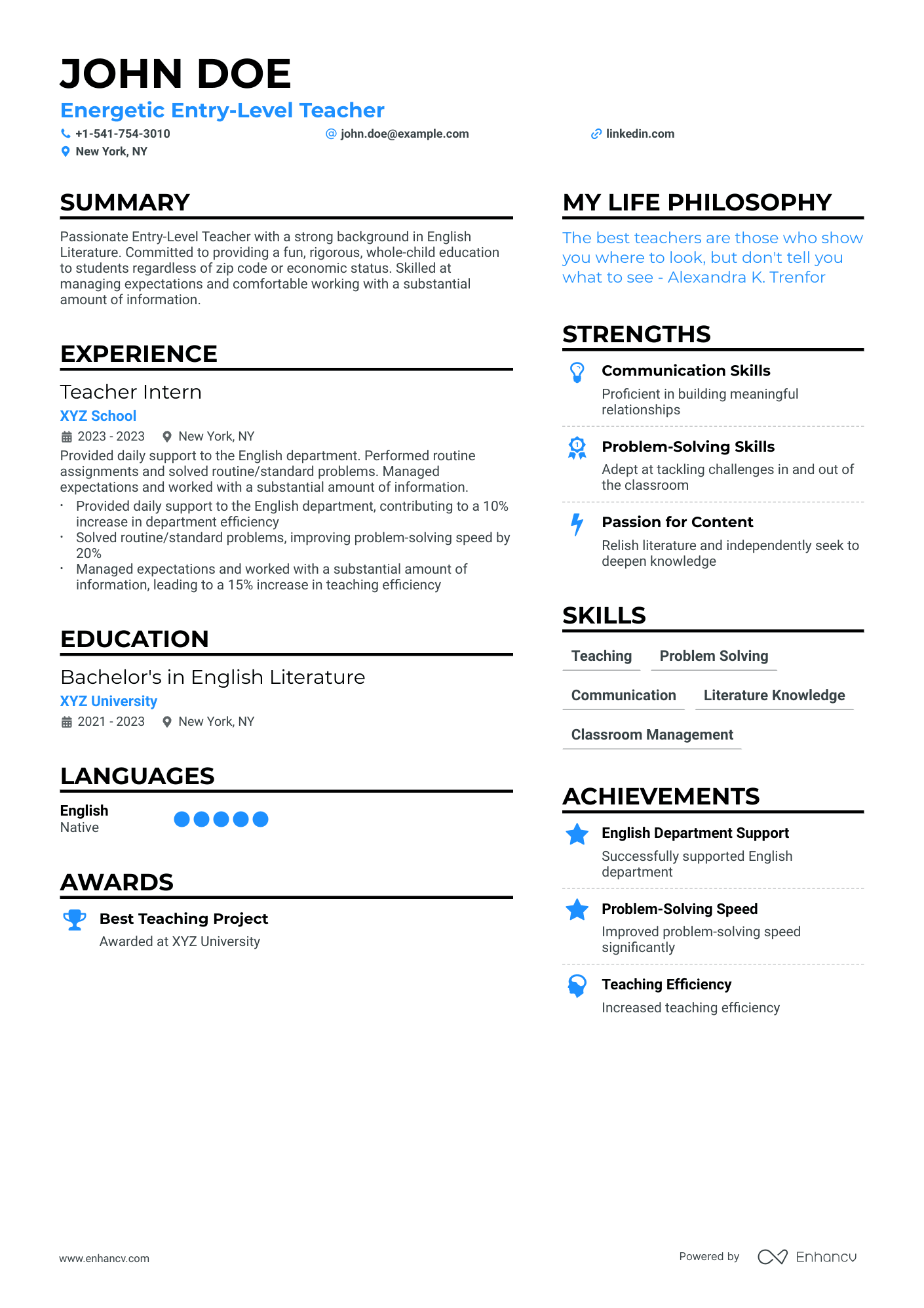Stepping into the job market for the first time can feel like setting sail on uncharted waters—it’s exciting but a little bit daunting. Crafting an entry-level resume is your first port of call, and believe it or not, it's your secret weapon to navigating these waters successfully.
Did you know that recruiters spend an average of just 7 seconds looking at a resume? That's hardly enough time to sip your coffee! This means your resume needs to hook their attention fast and hold it tight.
Writing a great entry-level resume is much like telling a good story. It should have a clear beginning, a compelling middle, and a strong end. Your job is to make sure that this story not only captures who you are but also resonates with what hiring managers are seeking. Remember, it’s not just about listing your qualifications—it’s about showcasing your potential.
Let’s dive in and discover how to plant the seeds of your career with a resume that grows interest and garners opportunities. Keep your chin up—every big career has to start somewhere, and yours starts with crafting a resume that stands out from the stack.
In this article, we’re going to cover:
- The best way to format your entry-level resume as well as the top sections to focus on and several things that recruiters are looking out for.
- How to effectively target and craft your work experience entries to make a meaningful impact.
- Why it’s crucial to list a variety of relevant hard and soft skills throughout your resume.
- The most successful ways to detail your education and certifications on an entry-level resume.
- How to create a compelling and attractive personal statement to act as a magnet to the recruiter’s eyes.
- Some very beneficial, although additional, sections to top off your resume and give you that extra appeal.
Here are some great guides for career-specific entry-level resumes:
- Entry-Level Mechanical Engineer Resume Guide
- Entry-Level Programmer Resume Guide
- Entry-Level Software Developer Resume Guide
- Entry-Level Financial Analyst Resume Guide
- Entry-Level Business Analyst Resume Guide
- Entry-Level Customer Service Resume Guide
- Entry-Level Digital Marketing Resume Guide
- Entry-Level Software Engineer Resume Guide
- Entry-Level System Administrator Resume Guide
- Entry-Level Cover Letter Guide
According to a study by the National Association of Colleges and Employers (NACE), nearly 80% of employers expressed intentions to hire recent college graduates. This indicates a strong market for entry-level positions as companies continue to value fresh talent with up-to-date education and new perspectives.
How to format an entry-level resume
When you're ready to launch your career, crafting the right entry-level resume is like picking the perfect outfit for a first date—it needs to make a good impression quickly. Here are the main resume formats you can choose from, each tailored to different types of job seekers:
- Reverse chronological format: This format lists your most recent job experiences or achievements first and works backward. It's great for those who have a straightforward career path in the field they're applying to, showing a clear progression in roles, which isn’t usually possible for an entry-level applicant.
- Functional format: Focuses more on your skills and less on your job history. This is ideal for candidates who may have gaps in their employment, are changing careers, or have skills that are strong but not necessarily gained through traditional employment.
- Hybrid format: Combines elements of both chronological and functional formats. It lists skills and qualifications first, followed by employment history. This format is useful for entry-level applicants who want to highlight relevant skills up front, while still providing a timeline of their work history.
For entry-level resumes, the hybrid format is often best. It allows you to showcase the skills and education relevant to the job upfront, while still outlining your professional and personal development over time.
Further considerations for crafting your resume:
Resume designs:
- Margins: Stick to 1-inch margins to keep the layout clean and uncluttered.
- Colors: Use subtle colors on your resume if any (like blues or greys) to maintain professionalism.
- Fonts: Choose easy-to-read resume fonts like Arial, Times New Roman, Rubik, or Calibri, and keep the size between 10 and 12 points.
- Columns: Single-column formats are generally best for ATS compatibility.
- Length: Keep your resume length to one page, especially for entry-level positions.
Contact information (resume header):
- Address: Generally, your city and state suffice; no need for a full address.
- Links: Include professional links like your LinkedIn profile or digital portfolio.
- Photo presence: Typically, it's advisable to leave resume photos off to avoid any unconscious biases.
ATS compatibility:
- Keywords: Use keywords from the job description throughout your resume.
- Simple formatting: Avoid headers, footers, tables, or other complex formatting that might confuse the ATS.
File formatting, naming convention, etc.:
- File format: Save your resume as a PDF to preserve the formatting unless otherwise specified.
- Naming convention: Use a professional format for naming your file, such as ‘FirstNameLastNameResume’.
By keeping these points in mind, you can create a resume that not only looks good but also passes through ATS systems smoothly, ensuring it gets into the hands of a human recruiter. Remember, your resume is your stepping stone into the professional world, so make it count!
Have you already got a resume? See how it holds up with Enhacv’s ATS Resume Scanner!
Different markets have specific resume formats – a Canadian resume could vary in layout.
Is your resume good enough?
Drop your resume here or choose a file. PDF & DOCX only. Max 2MB file size.
Here are the essential elements every entry-level resume needs to contain.
The top sections on an entry-level resume:
- Contact information: Essential for the recruiter to reach you.
- Education: Shows your formal training and qualifications.
- Skills section: Highlights relevant abilities and expertise.
- Work experience: Demonstrates practical application of skills.
- Certifications: Validates specialized knowledge and skills.
When you apply for an entry-level position, be sure to mention the following aspects.
What recruiters want to see on your resume:
- Relevant educational background: Indicates foundational knowledge necessary for the role.
- Internships or part-time experience: Shows practical experience and application of skills.
- Technical skills: Highlights specific capabilities required for the job.
- Soft skills: Demonstrates interpersonal and problem-solving abilities.
- Project involvement: Reflects hands-on experience and contributions to relevant projects.
The work experience section is usually the first thing you would work on. Applying for an entry-level position often means that the candidate won’t have any directly relevant experience, so choosing what to list as work history is essential as it needs to align with the job description.
How to write your entry-level resume experience
Listing work experience on an entry-level resume is crucial as it showcases your practical application of skills, adaptability, and commitment to the workforce, even if the roles are part-time, internships, or in unrelated fields.
Unlike regular resumes that focus on career progression and achievements, entry-level resumes often highlight learning experiences, growth, and potential.
Each work experience entry should include the job title, company name, location, dates of employment, and bullet points of responsibilities and achievements. These elements show your role's relevance and your impact, helping employers gauge your skills and how they might translate to the job at hand.
Each entry should be concise, using action verbs to vividly describe your roles and professional accomplishments, making your experience compelling and relevant to potential employers.
Applying for your first job is a lot like making pancakes. The first one is always a bit rough, but you have to throw one out to get to the good stuff.
Anonymous
Let’s use this posting for an entry-level job opportunity in the field of software development for future reference and to illustrate proper resume targeting:
Job Title: Entry Level Software Developer—Mentorship program and option to work remotely.
Company Introduction: Join BestTech, a fast-growing company that values emerging technology talent. We’re committed to providing you with the necessary skills to succeed and offer a flexible schedule along with the opportunity to work alongside some of the industry's leading software developers.
Job Description: We’re looking for a full-time, entry-level software developer eager to start their career. Ideal candidates are recent graduates seeking substantial career experience.
Salary: $35,000 per year with opportunities for advancement and bonuses.
Top Benefits or Perks:
- Comprehensive mentoring from top industry professionals.
- Full benefits package including health, vision, and dental insurance.
- Generous paid time off.
- Remote work options to accommodate your lifestyle.
Location: BestTech is based in Salt Lake City, Utah, known for its vibrant tech scene and stunning natural surroundings, offering an excellent quality of life and ample outdoor activities.
Application Process: To apply, please send your resume to hr@besttech.com by June 18, 2024. Selected candidates will be contacted for an interview.
Using the above job posting, let’s craft a couple of work history entries and see how to properly target them to the position you’re applying for and other best practices.
First, here’s an entry that most likely needs some improving:
- •Did stuff with computers.
- •Helped people sometimes.
- •Made things work better.
What they did wrong:
- Vague descriptions: Terms like "Did stuff with computers" and "Helped people sometimes" are extremely vague and don’t provide any specifics about what the tasks entailed or how they relate to the software development role being applied for.
- Lack of relevance: The work tasks listed don’t clearly connect to the skills or experiences valuable to a software development position. Even if the job wasn’t directly related, the candidate should highlight transferable skills or specific accomplishments.
- No measurable results: The listing doesn’t quantify any achievements or explain how "Made things work better" was accomplished or measured.
- Improper use of terminology: Casual language ("Did stuff", "things work better") lacks professionalism and fails to convey a serious attitude towards career development.
- Missed opportunity to highlight skills: Even in unrelated jobs, there are often opportunities to discuss relevant soft skills or technical competencies gained, such as problem-solving or teamwork, which are completely missing here.
For an entry-level software developer position at a company like BestTech, it's crucial to tailor even unrelated job experiences in a way that highlights applicable skills and professional growth.
If you need more clarity, let Enhancv help! Check out our article on targeting your resume and see how well your current resume performs.
Now that we know what’s wrong, let’s fix it!
- •Utilized software tools to manage customer orders efficiently, enhancing order accuracy by 15%.
- •Collaborated with a team of 5 to handle high-volume customer service scenarios, developing strong teamwork and communication skills.
- •Implemented a new method for tracking inventory that reduced waste by 10%, demonstrating problem-solving skills and attention to detail.
What was improved:
- Specificity in tasks: Descriptions are now clear and detailed, explaining exactly what was done and how it relates to skills relevant to software development, such as using software tools and implementing solutions.
- Relevance to the job: Each point ties back to skills that are transferable to a software development role, such as problem-solving, efficiency improvement, and teamwork.
- Quantifiable achievements: Achievements are quantified (e.g., "enhancing order accuracy by 15%", "reduced waste by 10%"), providing concrete evidence of the candidate's impact in previous roles.
- Professional terminology: The language used is professional and appropriate for a resume, reflecting a serious approach to career development.
- Highlighted applicable skills: The entry now highlights skills like teamwork, problem-solving, and the use of technology, which are crucial for the role at BestTech and show the candidate's potential beyond the specifics of their previous job environment.
This revised work history entry demonstrates how even seemingly unrelated experience can be framed in a way that showcases relevant skills and qualities for the target job.
Quantifying impact on an entry-level resume
Creating an impact on an entry-level resume by making it more number-oriented involves quantifying your experiences and accomplishments. Here's how and why this approach is beneficial:
How to create a number-oriented impact:
- Quantify achievements: Whenever possible, add numbers to illustrate your achievements. For instance, if you completed a significant project, mention the scale (e.g., "Led a team of 5 in a project that resulted in a 10% increase in efficiency").
- Include metrics: Use metrics to describe the impact of your internships, part-time jobs, or school projects. Examples include "Improved customer satisfaction by 15% through a new software implementation" or "Reduced data processing time by 30% through optimized code."
Why it's important:
- Demonstrates measurable impact: Numbers provide concrete evidence of your capabilities and show that you understand the value of outcomes, not just tasks.
- Increases resume clarity: Numbers break down your contributions into clear, digestible facts that are easy for hiring managers to understand at a glance.
- Enhances ATS performance: Many automated systems (ATS) that companies use to screen resumes are set to pick up on quantifiable data as indicators of a candidate’s potential impact.
- Sets you apart: In entry-level roles, where many candidates may lack extensive work experience, showing quantifiable achievements can differentiate you from others who only list duties.
Overall, incorporating numbers into your resume helps bridge the gap between theoretical knowledge and practical application, demonstrating your ability to contribute tangibly to potential employers. It makes your document more compelling and can often be the deciding factor in securing an interview.
More on ATS
Listing skills can significantly enhance the applicant tracking system (ATS) compatibility of a resume. Many companies use ATS software to scan resumes for keywords related to the skills required for the job. Including relevant skills not only tailors your resume specifically to the job you’re applying for but also increases the likelihood that your resume will pass through these digital filters and reach human eyes. This makes listing the right skills a strategic move for gaining visibility in a competitive job market, particularly when you may not have extensive work experience to stand out.
How to list your hard and soft skills on your resume
Having a skills section on an entry-level resume is crucial, much like having the right bait on a fishing line when you're aiming to catch a big fish. At the start of your career, you may not have a lot of work experience or many professional accomplishments to showcase. However, your skills are key indicators of your potential to thrive in a job. They highlight what you’re capable of and how you can contribute to a company, making your resume more appealing to recruiters.
Essentially, they help you "hook" the interest of potential employers, demonstrating that you have what it takes to succeed in the role, even if you're just starting out.
When selecting skills for your resume, start by analyzing the job description to identify key skills the employer values. This is particularly important for an entry-level position.
Hard skills
Choosing the right hard skills to list on your resume involves several strategic steps. Let’s consider the job posting from above for an entry-level software developer but they more or less are consistent for any position:
- Analyze the job description: Carefully read the job posting to identify specific skills mentioned. For example, if the posting emphasizes proficiency in certain programming languages, software development methodologies, or tools, these should be prominently listed on your resume.
- Match your skills with job requirements: Align your actual skills with those requested in the job description. List those skills first that are directly mentioned in the job posting, as these are likely what the recruiters are prioritizing.
- Consider the company’s tech stack and culture: Research BestTech’s technology stack and any specific tools or platforms they use, which can often be found on their website, in news articles, or tech blogs. If you have experience with any of these technologies, make sure to include them on your resume.
- Include relevant technical certifications: If you have certifications that validate your proficiency in key skills required for the job (e.g., Oracle Certified Java Programmer, Certified ScrumMaster), include these as they provide official proof of your capabilities.
- List tools specific to the role: Since this is a software development role, listing programming languages (like Java, Python, C++), development frameworks (like React or Angular), and other development tools (like Git, and Docker) that you’re proficient in is crucial.
- Prioritize modern and in-demand skills: Given that BestTech is described as a fast-growing company valuing emerging technology talent, emphasize skills that are current and in high demand within the tech industry, such as cloud services (AWS, Azure), and continuous integration/continuous deployment processes.
- Showcase project management and development tools: Since software development is often collaborative and iterative, showing familiarity with agile methodologies, project management tools (like JIRA or Trello), and version control systems (such as Git) can be particularly appealing.
- Tailor each application: Customize the skills on your resume for each job application based on the job description and company profile. What works for one job application at one company might not be as effective at another.
By carefully selecting and prioritizing hard skills that align with the specific requirements and context of the job posting at BestTech or whatever Tech, you can create a targeted resume that stands out to recruiters and demonstrates your capability and fit for the role.
Below we’ve aligned our skillset with the previous job posting to better illustrate the technique. Have a look.
Targeted hard skills for your entry-level resume
- Java programming
- Python programming
- JavaScript
- SQL server
- C++ development
- Git version control
- RESTful APIs
- Node.js
- React skills
- Agile methodology
- Docker containers
- Unit testing
- Continuous Integration/Continuous Deployment (CI/CD) processes
- Cloud services (AWS, Azure)
- Linux operating system
- HTML/CSS
- XML and JSON data formats
- Software debugging
- Angular framework
- TypeScript programming
Soft skills
Much like with hard skills, choosing the right soft skills, especially for a specific job posting like the entry-level Software Developer, involves a strategic approach to match your qualifications with the employer’s expectations and the job’s requirements.
Here’s how you can determine the best soft skills to include:
- Analyze the job description: Carefully read the job posting to identify key attributes or competencies the employer emphasizes. Look for any soft skills mentioned directly or implied through responsibilities and expectations. For instance, terms like "team collaboration," "flexible schedule," and "remote work" suggest valuing communication, adaptability, and self-management.
- Understand the company culture: Research the company’s culture and values, often outlined in the job posting or on the company’s website. For BestTech, their commitment to mentoring and fostering emerging talent suggests they value continuous learning, receptiveness to feedback, and a collaborative nature.
- Reflect on role-specific needs: Consider the daily responsibilities and overall goals of the role. Software development, especially at the entry-level with mentoring, requires problem-solving, attention to detail, and creativity in technical solutions.
- Consider the work environment: Since the position offers options for remote work, skills like time management, self-motivation, and effective communication are crucial to perform tasks independently and stay connected with the team.
- Match your skills with requirements: From your list of soft skills, choose those that best align with the job description and your understanding of the role and company culture. Ensure these skills are not only mentioned but are also substantiated by specific examples in the experience or achievements sections of your resume.
- Prioritize based on impact: Select skills that can make the most significant impact on your application. For example, in a mentoring-rich and remote work environment, emphasize your ability to learn quickly, manage your time efficiently, and collaborate across digital platforms.
- Tailor and refine: Tailor your resume for the specific job by focusing on the most relevant soft skills. It's better to provide a few highly relevant skills with concrete examples than to list many generic skills.
Below is a list of soft skills aligned with the BestTech job offer. Have a look and you’ll see the connections as well as some generally good skills to possess in a job hunt.
Targeted soft skills for your entry-level resume
- Effective communication
- Team collaboration
- Adaptability to change
- Problem-solving abilities
- Attention to detail
- Time management
- Creativity thinking
- Proactive learning attitude
- Empathy with team members
- Willingness to learn
- Leadership potential
- Conflict resolution
- Resilience
- Capacity to work under pressure
- Strong work ethic
- Organizational skills
- Client-oriented approach
- Initiative in project involvement
- Self-motivation
Now, let’s consider the other essential element of your application—your education.
How to list certifications and education on your resume
Listing these elements on an entry-level resume is highly important, especially when work experience might be limited. This section of the resume provides a clear indication of your formal knowledge and training, which reassures employers of your foundational qualifications and readiness for the role.
An education section shows your academic background and understanding of the field, while certifications and licensures are proof of specialized knowledge and skills that have been validated through standardized processes.
For jobs that require specific technical skills or adherence to industry standards, these qualifications can be critical. They not only enhance your credibility but also set you apart from other candidates who may not have similar credentials. This is particularly essential in fields like healthcare, engineering, IT, and others where up-to-date knowledge and compliance with legal requirements are crucial for the position.
Let’s examine them a bit closer.
Education entry
An education listing on an entry-level resume should provide clear and concise information that highlights your academic achievements and relevancy to the job you’re applying for. Here's what it should typically include:
- Name of the degree: Including the type of degree (e.g., Bachelor of Science, Master of Arts) shows the level of education attained.
- University or college name: This offers credibility and recognition; prestigious or well-known institutions can particularly strengthen a resume.
- Graduation date: Listing whether you have graduated or the expected graduation date helps employers understand your timeline.
- Grade point average (if applicable): This is only a good idea if your GPA is 3.5 or above.
- Major and minor (if applicable): This shows your area of specialization which is especially important if it directly relates to the job.
- Relevant coursework, honors, and achievements (optional): These can be included to show specific skills or academic excellence.
Here’s an excellent example based on the job offer above.
- •Relevant Coursework: Data Structures and Algorithms, Web Development, Machine Learning
- •Honors: Dean’s List 2021-2023, Recipient of the Tech Innovator Scholarship
This example is effective because it provides a clear snapshot of the candidate’s academic background, emphasizing areas that are relevant to potential employers in tech. It includes a high GPA and honors to underscore a commitment to excellence, and the relevant coursework directly aligns with the skills needed for the targeted job offer.
Such entries help to paint a comprehensive picture of the candidate as a capable and driven individual who’s prepared to transition successfully into the professional world.
Certification and licensure
A certification section or licensure on an entry-level resume should clearly outline the qualification, issuing organization, and the date of acquisition or expiry if relevant. This information highlights specialized skills and compliance with industry standards, which can be crucial for certain positions.
Here’s what an entry should look like.
- •Java SE 8 Programmer
- •Issued: June 2023
This example is effective because it provides all essential details in a clear and concise manner. Mentioning a well-known certifying body like Oracle enhances the resume's strength, while the specificity of the certification (Java SE 8) clearly aligns with job requirements in the tech sector.
The recent date of issuance helps reassure potential employers of the candidate’s up-to-date knowledge and readiness to contribute effectively in a technical role.
Including such certifications can significantly enhance an entry-level candidate's appeal by showing commitment to their professional development and expertise in specific areas needed for the job.
The last significant section left to discuss is the personal statement that lives at the beginning of all resumes and is perhaps the most important of all the parts. Let’s explore that more below.
Every pro was once an amateur. Every expert was once a beginner. So dream big and start now.
Robin Sharma
How to write a successful entry-level objective
An objective statement on an entry-level resume is a brief declaration of your career goals and how you aim to contribute to the company you're applying. It's important because it shows your direction and enthusiasm, which is crucial when you have limited work experience.
The objective is different from a resume summary, which instead of focusing on what you hope to gain, highlights what you already bring to the table—summarizing your skills, experiences, and achievements. For entry-level applicants, an objective can be more suitable to communicate ambition and potential when substantial experience isn’t yet a factor.
Let’s first have a quick look at what an insufficient objective statement consists of.
The above statement is lacking because it centers primarily on the applicant's desires for personal growth ("learn more about programming and improve my coding skills"), rather than emphasizing what they can offer to the company.
This self-focused approach does not align well with the needs of the offer from BestTech, which seeks candidates eager to contribute as well as grow. Additionally, the statement lacks specificity; it doesn't mention any particular skills or how the applicant's goals align with BestTech's mission or needs.
It also reads as generic and could apply to almost any software developer position at any company, indicating a lack of effort to tailor the resume to the specific role and company, thereby diminishing the applicant's chances of standing out in a competitive field.
A more effective objective would directly address the goals of BestTech, demonstrating the candidate's enthusiasm for contributing to the company's success and highlighting any relevant skills or experiences aligned with the job description.
Here’s a version that’s worthy of mimicking.
This one clearly aligns the candidate’s career goals with the company’s values and the specifics of the job, demonstrating a strong fit and a clear understanding of what the company offers.
Optimize your resume summary and objective for ATS
Drop your resume here or choose a file.
PDF & DOCX only. Max 2MB file size.
Additional sections for an entry-level resume
There are several additional sections that you can include on an entry-level resume to help you stand out. These sections can showcase a broader range of qualifications and interests, making yourself more appealing to potential employers:
- Professional portfolio or projects: Including a section for relevant projects or a portfolio can demonstrate practical skills and experience. This is especially valuable for roles in creative, technical, or project-based fields. This demonstrates your ability to apply theoretical knowledge in real-world scenarios.
- Volunteer experience: Listing volunteer work can be particularly impactful, demonstrating a commitment to the community and the development of soft skills like teamwork, leadership, and communication. This section can be crucial if you have limited work experience.
- Professional affiliations and memberships: This section shows active participation in professional organizations, which can be appealing to employers as it often indicates a candidate's dedication to their career field and ongoing professional development.
- Awards and honors: Recognitions, whether academic or professional, can serve as a testament to your capability and excellence in various areas.
- Languages: Listing language skills can significantly enhance a resume, especially in roles that require communication with diverse populations or in global companies.
- Interests and hobbies: While often overlooked, this section can offer insights into your personality and potential cultural fit within a company. Strategic mentions of interests that align with the company's culture or the role can make a resume more memorable.
Each of these sections provides an opportunity to present a more rounded picture of a candidate, beyond just educational and professional history. They add depth to a resume, showing initiative, diversity of skills, and a readiness to contribute in various areas, making the individual more attractive in a competitive job market.
PRO TIP
When applying for an entry-level job, the most important thing to remember is to clearly demonstrate your potential and eagerness to learn!
Key takeaways
Diving into crafting your entry-level resume is a bit like setting up your first domino in a chain—place it correctly, and you'll set off an impressive cascade of opportunities… or miss completely.
Here are the key takeaways from our guide to ensure your resume makes a splash:
- Tailor your resume format: Choose a hybrid format combining relevant skills and chronological work experience to showcase your capabilities effectively.
- Optimize for ATS: Include keywords from the job description and avoid complex formatting to ensure ATS compatibility.
- Highlight relevant skills: Clearly list both hard and soft skills that align with the job requirements and company culture.
- Quantify achievements: Where possible, use numbers to demonstrate the impact of your contributions in previous roles or projects.
- Detail your education (and certifications): Include your degree, institution, graduation date, and any relevant honors or coursework.
- Objective statement: Use this to show enthusiasm and clarity in your career goals, tailored to the company and position.
Remember that each job is unique and requires a targeted resume and cover letter. Do your research and take the time to tailor your application to the job offer—your chances of success will multiply significantly!





